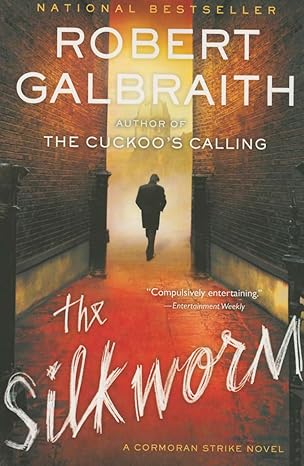| We’ve now posted a total of 17 book reviews. |
| Available now at the Amazon.com website … CLICK HERE! |
| Any and all books purchased through our website cost you nothing extra, but do help support our ongoing efforts. |
 Robert Galbraith’s “Career of Evil” is the series entry where the procedural grows teeth. The mystery doesn’t simply land on Cormoran Strike’s desk; it steps across the threshold and makes itself at home, turning the office into a frontline and forcing choices that can’t be outsourced to the police or to patience. The book is darker than its predecessors, but not gratuitous; the chill comes from proximity and from how plausibly menace can organize itself. Galbraith sets a steady tempo—interviews, maps, timetables—yet threads a private thrum beneath it: the pressure of being watched, second-guessed, and baited. By design, “Career of Evil” is less whodunit clockwork and more a campaign you survive by outworking it. Robert Galbraith’s “Career of Evil” is the series entry where the procedural grows teeth. The mystery doesn’t simply land on Cormoran Strike’s desk; it steps across the threshold and makes itself at home, turning the office into a frontline and forcing choices that can’t be outsourced to the police or to patience. The book is darker than its predecessors, but not gratuitous; the chill comes from proximity and from how plausibly menace can organize itself. Galbraith sets a steady tempo—interviews, maps, timetables—yet threads a private thrum beneath it: the pressure of being watched, second-guessed, and baited. By design, “Career of Evil” is less whodunit clockwork and more a campaign you survive by outworking it.
As character study, the novel hits a new stride. Strike operates with the hard pragmatism of a veteran who knows that endurance is a skill; he’s stubborn, sometimes unromantically so, but his discipline reads as care. Robin Ellacott continues her quiet ascent from assistant to partner-in-fact, balancing empathy with tactical nerve. “Career of Evil” gives their partnership heat without melodrama: small miscommunications, different risk tolerances, professional admiration edged by personal complication. The book understands how trust is built—through errands taken seriously, through showing up on the day when the job is not theoretical. Their scenes together are the humane ballast that keeps the darker material from feeling merely grim. As a procedural, “Career of Evil” is meticulous. Leads take you across counties and subcultures; suspects are not a parade of types but people with histories, injuries, and the kind of self-justifications that make interviews slippery. Galbraith excels at logistics: the commute that tightens a schedule, the email that lands at the worst moment, the long tail of administrative detail that investigative work requires. Interleaved sections from an unnamed predator add unease without tipping into spectacle, sharpening the reader’s focus on the practical work of prevention and proof. Technology appears as a tool rather than a magic wand; the heavy lifting is still patience, note-taking, and the ability to read what isn’t being said. Thematically, “Career of Evil” looks squarely at violence and control—the cultural scripts that minimize harm, the institutional gaps that let it recur, and the private reckonings that follow. The book is clear-eyed about misogyny without making suffering its centerpiece; it’s more interested in how people build (or rebuild) agency under pressure. It also probes professional ethics: how far a private firm should go, what lines you draw when the target is personal, and what justice looks like when formal channels move too slowly. Alongside these heavier strands, Galbraith keeps a reporter’s attention on class, work, and the small economies of London life—rent, commutes, bad coffee—so that the investigation always feels grounded in real days. Stylistically, the writing is unshowy, brisk, and precise, with a dry humor that surfaces just often enough to let you breathe. If the novel sprawls more than the earlier books, the length buys credibility: when conclusions arrive, they feel earned because the ground has been walked, called, filed, and checked twice. “Career of Evil” stands on its own while deepening the series’ emotional arc. It’s a tough, absorbing read—grown-up in its themes, rigorous in its craft, and humane in its regard for the people doing the work. Close the final chapter and you carry not just an answer, but a sense of what it costs to get one. |
